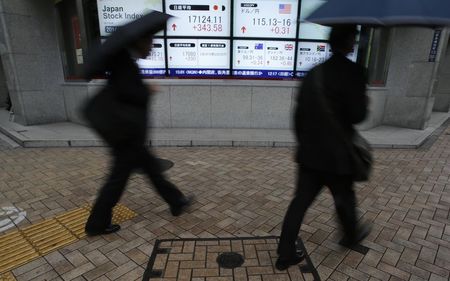By Wayne Cole SYDNEY (Reuters) - Asian share markets were broadly higher on Monday as the prospect of further policy stimulus in China and Europe whetted risk appetites while sending the euro skidding.
The single currency was near 28-month lows having shed 1.2 percent on Friday when European Central Bank President Mario Draghi surprised by declaring his commitment to fighting deflation.
That came hot on the heels of an unexpected cut in interest rates from the People's Bank of China, and sources told Reuters Beijing was ready to ease further to head off slowing inflation.
"China's rate cut adds to the determination of global policy makers to avoid deflation and support growth," said Shane Oliver, head of investment strategy at fund manager AMP Capital in Sydney.
"While U.S. quantitative easing may have ended, it's being replaced by QE in Japan and Europe and rate cuts in China," he added. "This in turn augurs well for shares and other growth assets."
Wasting no time, Chinese stock markets rallied, with a key index at its highest level in around one-and-a-half years.
The CSI300 Index (CSI300) of the largest companies listed in Shanghai and Shenzhen opened up 1.2 percent at its highest level since June 2013, while the Shanghai Composite Index (SSEC) opened up 0.8 percent. Stocks in Hong Kong were also up 1.9 percent.
Tokyo's market was closed for a holiday on Monday, but MSCI's broadest index of Asia-Pacific shares outside Japan (MIAPJ0000PUS) jumped 1.3 percent - its biggest daily gain in a month. Australia's main index (AXJO) climbed 1 percent.
The Dow (DJI) and S&P 500 (SPX) both added 0.5 percent on Friday, while the Nasdaq (IXIC) put on 0.24 percent. Germany's DAX (GDAXI) and France's CAC (FCHI) rose nearly 3 percent in anticipation of more action by the ECB.
"We will do what we must to raise inflation and inflation expectations as fast as possible," Draghi told an audience of bankers in Frankfurt, seemingly inching closer to outright purchases of government bonds.
The comments took a heavy toll on the euro which was down at $1.2375 EUR/USD having shed almost two cents on Friday. That was just a whisker away from a two-year low of $1.2358 plumbed earlier in the month.
Against the yen, the euro fetched 145.69 (EUR/JPY), having dropped from a high of 148.43 on Friday.
The greenback was at 117.71 yen USD/JPY, off a seven-year high of 118.98 set last week. It faded somewhat on Friday after Japanese Finance Minister Taro Aso said the yen's recent fall was "too rapid" and undesirable.
The euro nursed particularly heavy losses against the Australian dollar, which climbed after China surprised with its interest rate cut. It traded at A$1.4239 (EURAUD=R) after shedding nearly 2 percent.
Sources said China's leadership and central bank were ready to cut rates again and loosen lending restrictions, concerned that falling prices could trigger a surge in debt defaults, business failures and job losses.
The cut in rates was the first in more than two years and reflected a change of course by Beijing which had finally decided that a bold monetary policy step was required to stabilize the world's second-largest economy.
In commodity markets, oil went flat ahead of a key meeting of OPEC on Thursday amid much uncertainty whether producers would agree on a meaningful cut in output to support prices. Brent was up a cent at $80.37 a barrel, while U.S. crude dipped 3 cents to $76.48.

Gold <XAU/USD> was steady at $1,201.20 an ounce, as traders cheered the prospect of more global stimulus.
(Editing by Shri Navaratnam)